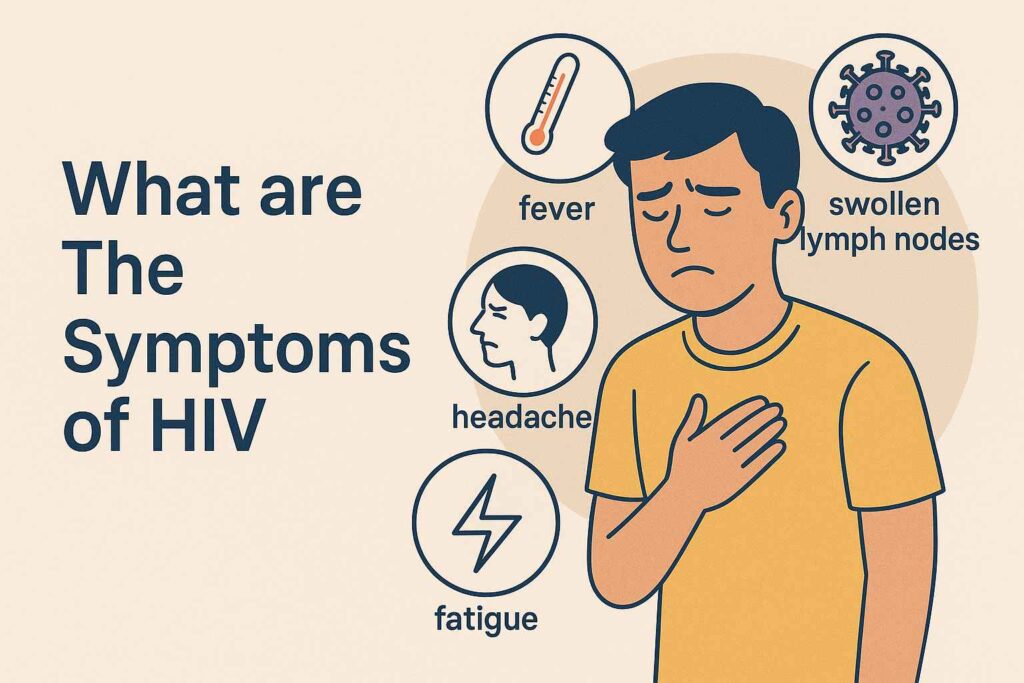Last updated on May 12th, 2025 at 12:17 pm

What is HIV or human immunodeficiency virus?
Human immunodeficiency virus (HIV) has infected millions of people around the world. HIV infection causes the immune system to deteriorate continuously, eventually leading to acquired immunodeficiency syndrome (AIDS).
HIV, a type of RNA virus, on entering the body, attacks and destroys CD4 T lymphocytes. CD4 cells help fight against infection. The average CD4 cell count is 500-1500 cells/mm3. When the CD4 cell count decreases below 200 cells/mm3, it can indicate AIDS.
How does HIV pass from one person to another?
- Unprotected sexual intercourse
- Infected blood through infected needles, infected syringes, and rarely through blood transfusion
- Organ transplant
- Mother to infant during pregnancy, delivery or breastfeeding
- How does the body react to HIV infection?
The virus has a varied effect on each person’s body. Some people may not have any symptoms. Symptoms of HIV vary depending on the stage of infection. The presence of HIV does not always imply the existence of AIDS.
Stages of HIV symptoms
Stage 1: Acute HIV infection
During this time, the infection is contagious. In the initial 2 to 4 weeks of infection, the symptoms of HIV may resemble flu-like symptoms:
- Fever
- Fatigue
- Body ache
- Sore throat
- Chills
- Mouth ulcers
- Rashes
- Night sweats
- Swollen glands
- Nausea
- Vomiting
Stage 2: Asymptomatic stage
After the initial stage, you may not show any symptoms of HIV for years. You can feel healthy throughout this time. As a result, you may be unaware that you have been infected. During this phase, however, the virus will continue to multiply and impair the immune system. If the prescribed HIV treatment regimen is followed, you may never reach Stage 3.
Stage 3: Acquired immunodeficiency syndrome (AIDS)
HIV infection affects your immune system and makes you susceptible to opportunistic infections or other serious illnesses. Harmful bacteria, fungi and viruses can cause more frequent and severe infections.
Symptoms of HIV in this stage include:
- Rapid weight loss, greater than 10% from baseline
- Fever that lasts over a month
- Diarrhoea that lasts over a week
- Night sweats
- Recurrent infections: bacterial, viral and fungal
- Cough
- Mouth ulcers
- Oral thrush, or white patches in the mouth
- White patches on the tongue
- Skin problems: red, purple, brown or pinkish marks on or under the skin, warts, impetigo (red, itchy sores that form yellow scabs), shingles (painful rashes in groups)
- Loss of memory
- Depression
- Pneumonia
- Life-threatening conditions: tuberculosis, cryptococcus meningitis, serious bacterial infections, cancer
Many people do not progress to this stage with timely and appropriate treatment. Without HIV medication, people with AIDS usually live for three years or less.
Is there a difference between symptoms and signs of HIV between genders?
Although most of the symptoms of HIV are similar in men and women, some are gender-specific.
HIV symptoms in women
- The symptoms are noted in the later stages of the condition.
- Changes in the menstrual cycle: lighter or more bleeding, skip cycles, severe PMS
- Belly pain
- Pain during penetrative sex
- Unusual discharge from the vagina
HIV symptoms in men
- Reduced sex drive
- Ulcers on the penis and anus
- Burning sensation while urinating
- Belly and lower back pain
- Bloody urine
- Pain during ejaculation
HIV testing
Given that symptoms of HIV may not manifest for several years, an HIV test is the only way to determine if you are infected. If you suspect HIV exposure, seek medical attention as soon as possible. Post-exposure prophylaxis can be started immediately as soon as you get diagnosed.
There are various tests with a specific window for testing. Your doctor will determine which test is best for you.
How to live healthy with HIV?
The human body cannot remove the HIV virus. Fortunately, anti-retroviral therapy (ART) can lower the viral load in your body. You can stay healthy if you combine this with a healthy lifestyle.
Consultation with a doctor is a must if you experience symptoms of HIV infection. An early consultation with the right medication may help prevent extreme outcomes of HIV infection as well.
Buying medicines is now simpler. With Medkart, you get the best prices and doorstep delivery! Visit Medkart today!
FAQs related to HIV
1. Does HIV spread by being around an infected person?
No, it doesn’t. You can only contract the HIV virus by having unprotected sex with someone who has the virus or by sharing a needle with them.
2. How do I deal with being HIV positive?
Follow your doctor’s advice and medications. Talk to friends and family and join self-help groups.
3. Do symptoms of HIV develop immediately after infection?
No, HIV infection can remain latent for several years. As a result, symptoms of HIV may not develop immediately after infection.